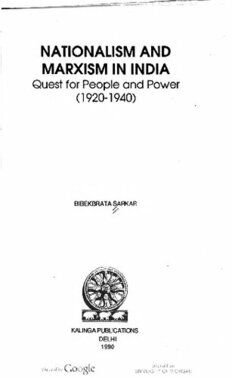
Nationalism and Marxism in India: Quest for people and power (1920-1940) PDF
Preview Nationalism and Marxism in India: Quest for people and power (1920-1940)
.777"-.» - NATIONALISM AND MARXISM IN INDIA Quesf for People and Power (1920-1940) BIBEKBRATASARKAR 7 73-7-.:f\Fv-’ 5!’?-a ‘_,‘../ 4010;‘. . KALINGAPUBLICATIONS DELHI 1990 G0 glc as 4%-45 .s..;~arI(. Win © BIBEKBRATA SARKAF-I 1990 ISBN 81-B5163-09-X Rs. 200.00 Published by: Smt. Hem Lata Kalinga Publications, 10A POCk6l I, | Mayur Vihar, Delhi - 110091 (India) Laseriypeset at Quick Phetocomposers, 2E, Rani Jhansi Marg New Delhi - 110055 Ph: 521441, 520232. Printed at Mehfla Offset Press, Delhi. C-0 316 Wr_ Dedication FOR MY MOTH ER PRATIVA FOR MY LATE FATHER CHARU CHANDRA G0 31¢ '\ [*"l‘"‘iE‘* ““1*’ G01 ‘S19 UN|VERgj|FTiprLr]EaIJ|iir_(ij\;1|iCHIGAN _ Z - —-§GI'- ‘I'I-— — i_ ___'____________,__-—l| CONTENTS Page Acknowledgement i Preface iii CHAPTER 1. The Setting 1 2. Non-Cooperation and Beyond 27 3. The Radical Thrust 61 4. The Marxian Altemative B6 5. Facing the Crises 126 6. Concluding Remarls 183 Bibliography 194 Index 198 C-0 316 ' _ iii" 11;] "|-=11‘ i"r:]""|" 60* 819 Ul\l|\J'EP.S|T“r’ or l"--'l|CH|GAl\l ACKNOWLEDGEMENT In the preparation of this book I am indebted to: My wile, Manlu, tor aooepting long hours of silence on mypart; My sons, Joyobroto and Nilanlan, for helping rne in preparing the final draft. Professors Manoranjan Mohanty and S.K. Chaube tor the discussions I had ililh them, Aiay Shankar, Satish Kumar Jha, and Tarun Kumar tor assisting me ’_u_f(iT|'I books and other material; Nand Lal tor typing the manuscfpt at short notice; Rajat Sood tor publishing the book in record time. G0 glc i:i"~§_] "|-=11" i"~:]"'|‘ G01 '81? UNIVERSITY or l'--'l|CH|£3Al\l PREFACE ' This book intendsto explore afewthernes,lnthecourse of thefreedom struggle currents and cross—currents of politics involving the Congress as an organization and its relations with marxian parties and groups—also involved in this struggle-historically shaped certain patterns of political functioning which deserve to be intensively studied in their own right, and for reasons of contemporary relevance, These were formed in response to pressures generated over a spectrum of commitments andconstraints—ideology, organisation, forms of struggle, leadership, challenges of class and sectional interests, and colonial repression or interference. Consequently, they could very well be seen as equations of accommodation and confrontation within a state of increasing complexity. Growing communlal pressures were abetted by colonial state. The weaknesses of nationalist and marxist politics in efficiently confronting this chatlenge created a cleanage in the quest for the ideological solidarity of people sought by marxists, and a political community on_anatlonal scale desired bythe Congress. Rising rnilitancy of the peasant workers and the working class posed challenges to the Congress‘ search for hegemony. However, the characteristic make-up of the Congress as a party, the manner of conflict resolution,the approach to political mobilisation, and the build-up of nationalist hqemony, to mention a few, are patterns of functioning which have continued to remain meaningful in independent India. An analysis of these pattems is of particular relevance for a proper understanding of the present-day Indian polity. Other themes are also of comparable significance. Caste and tribal mobilization, the growing shift in the Congress Party towards electoral politics and the increasing rigidity in its policy of accommodating representative critical opinion were trends that remained active“ in free lndiailt was also during this period that the social classes and groups were politicized. The political struggle against colonial rule deserves to be seen as a combined effort enriched by the contributions of several streams of thought and action. Oi equal significance should bathe controversial contention that in the larger competitive interaction between liberal nationalism and marxism, the advocates of marxism could not come to a leading position because they failed to bring about a creative application of theory to the complex Indian context. C-0 glc I 3 I i'Ii"~:;_| "l-Li i"|:j1""|" Eel GU» '81? l_ll--lli.fEPtE5lT'"r’ or l'--'llCIHl£3Al---l
